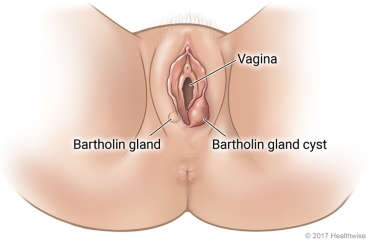Bartholin Cyst Surgery: Before Your Surgery

What is Bartholin cyst surgery?
Bartholin cysts are fluid-filled sacs in your Bartholin gland. These glands are located on each side of the vaginal opening. They can become infected and form an abscess, or sac of pus. If a cyst is infected, large, or painful, your doctor may need to cut a small hole in the cyst to let fluid drain.
You may also have other procedures to treat the cyst:
- Word catheter.
The doctor makes a small cut in the cyst. This cut is called an incision. Then the doctor puts a small rubber tube, called a catheter, in the incision. The catheter keeps the area open so fluid can drain out of it. This treatment can be done in the doctor's office. The doctor will numb your vulva so you feel less pain. Your doctor will take out the catheter after several weeks.
- Marsupialization.
The doctor makes a small incision in the cyst. Then the doctor puts a few stitches on either side of the incision. Fluid from your cyst drains out of this small, permanent opening. This treatment is often done in an operating room of a hospital or surgery centre. The doctor will numb your vulva so you feel less pain. And you may have general anesthesia.
- Excision.
The doctor cuts out the entire cyst and sometimes the gland and duct. This is not done often. This is a more complex surgery. It is done in an operating room of a hospital or surgery centre. The doctor will numb your vulva so you feel less pain. And you may have general anesthesia.
Most people go home the same day of surgery. You can expect to feel better each day. But you will probably need 2 to 4 weeks to recover. You may want to avoid sex until your vulva is healed.
Unless you had an excision surgery, it is possible for your cyst to come back. Some people need more than one surgery to permanently get rid of a cyst.
How do you prepare for surgery?
Surgery can be stressful. This information will help you understand what you can expect. And it will help you safely prepare for surgery.
 Preparing for surgery
Preparing for surgery
- Ask your doctor if you will need someone to take you home. Anesthesia and pain medicine can make it unsafe for you to drive or get home on your own.
- Understand exactly what surgery is planned, along with the risks, benefits, and other options.
- If you take aspirin or some other blood thinner, ask your doctor if you should stop taking it before your surgery. Make sure that you understand exactly what your doctor wants you to do. These medicines increase the risk of bleeding.
- Tell your doctor ALL the medicines and natural health products you take. Some may increase the risk of problems during your surgery. Your doctor will tell you if you should stop taking any of them before the surgery and how soon to do it.
- Make sure your doctor and the hospital have a copy of your advance care plan. If you don't have one, you may want to prepare one. It lets others know your health care wishes. It's a good thing to have before any type of surgery or procedure.
What happens on the day of surgery?
- Follow the instructions exactly about when to stop eating and drinking. If you don't, your surgery may be cancelled. If your doctor told you to take your medicines on the day of surgery, take them with only a sip of water.
- Follow your doctor's instructions about when to bathe or shower before your surgery. Do not apply lotions, perfumes, deodorants, or nail polish.
- Do not shave the surgical site yourself.
- Take off all jewellery and piercings. And take out contact lenses, if you wear them.
 At the hospital or surgery centre
At the hospital or surgery centre
- Bring a picture ID.
- You will be kept comfortable and safe by your anesthesia provider. The anesthesia may make you sleep. Or it may just numb the area being worked on.
- You will probably go home the same day.
When should you call your doctor?
- You have questions or concerns.
- You don't understand how to prepare for your surgery.
- You become ill before the surgery (such as fever, flu, or a cold).
- You need to reschedule or have changed your mind about having the surgery.
Where can you learn more?
Go to https://www.healthwise.net/patientEd
Enter A859 in the search box to learn more about "Bartholin Cyst Surgery: Before Your Surgery".
Current as of: August 2, 2022
Author: Healthwise Staff
Medical Review:Sarah Marshall MD - Family Medicine & Kathleen Romito MD - Family Medicine & Martin J. Gabica MD - Family Medicine & Kirtly Jones MD - Obstetrics and Gynecology
